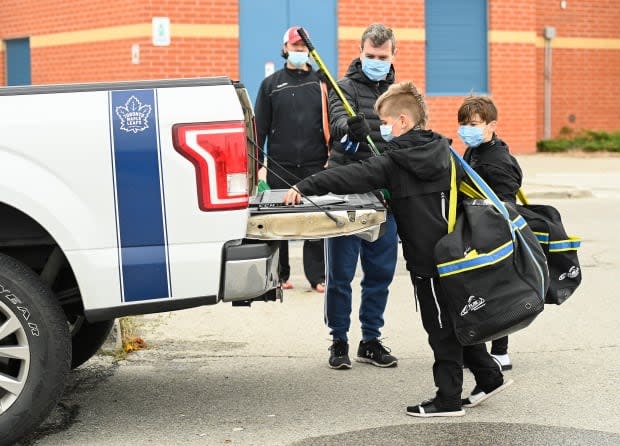Saskatchewan Union of Nurses says its membership is 'utterly disappointed' with new COVID-19 'half measures'
Reaction from various sectors to Saskatchewan's newly announced COVID-19 restrictions ranges from disappointment to criticism of "half measures" to a grudging acknowledgment that something had to be done.
The latest measures to fight the spread of the coronavirus, which were announced Wednesday and come into effect Friday, include suspending sports competitions, further limiting gatherings at restaurants and in places of worship, discouraging gatherings beyond immediate households and encouraging mask use for younger children.
The new provincial rules suspend "all team/group sports, activities, games, competitions, recitals, practices, etc. … including amateur and recreational leagues for all groups."
Kelly McClintock, general manager of the Saskatchewan Hockey Association, said the government advised athletics organizations in the province to re-examine their return-to-play guidelines starting last week, so the decision to suspend all games came as a surprise.
"We assumed that there would be some more restrictive guidelines put in place this week," he said. "We didn't assume that we'd be shut down completely.… It's disappointing."
The new measures do say that athletes under the age of 18 can continue to practise, as long as they're masked, physically distanced, and in a group no larger than eight.
McClintock says that will be difficult to actually do under the new regulations.
"Most teams are anywhere from 12 to 20 players … so I'm not sure how many people will actually take advantage of that from a team perspective," he said.

Bob Reindl, executive director of Saskatchewan Athletics, said young track and field athletes will face similar challenges.
"Right now in Saskatoon they only have an hour to practise anyways," he said. "So you can only have eight people, and it usually takes an hour for 30 kids to go through. It's going to be difficult."
Despite those challenges, Reindl said suspending sports was simply the right thing to do.
"It had to be done," he said. "There's no doubt about it. The numbers are high, the government had to do something, and we knew it was coming. Both Alberta and Manitoba already shut down sports in their provinces."
Until team sports resume, McClintock is worried about how children will cope with one less outlet to keep fit and spend time with friends. There are over 20,000 minor hockey athletes alone in the province, he said.
"Kids need the activity from a mental health perspective and a physical health perspective," he said. "Now, that's going to be cut down, and that's the disappointing part."
'Have to be some education' on masks: daycare
Wednesday's new measures also extend mandatory, non-medical masking to all students, employees and visitors in schools and daycares.
Children under three are exempt, but those between the ages of three and 12 should wear a mask if they are able to, the new rules say.
Nancy Lautner, executive director of Tykes and Tots Early Learning Centre in Saskatoon, says the guideline threads the needle between keeping kids healthy and not setting a bar that would be impossible for them to meet.
"I do appreciate that the province worded the masking policy for the young children the way they did, in terms of saying very young children should wear a mask if they are able to," she said.
"Some of our three to five year olds are certainly capable of wearing a mask and they won't have an issue with it, but some are not. So I appreciate that they've left that leniency."
At Tykes and Tots, students in the before- and after-school programs have already been wearing masks, as have staff members.
Now, it will be a matter of educating the younger children on how to mask up — but early childhood educators are experts on teaching hygiene to kids.
"There will certainly have to be some education that staff will have to do, in the same way that they educate about washing your hands and sneezing into your elbow and things like that," said Lautner.
'Each business is in limbo'
Restaurants and licensed establishments such as bars and nightclubs will now have to limit their seating to four people per table, and will also have to maintain a record of all their guests.
Shawn Moen, a co-founder of 9 Mile Legacy Brewing in Saskatoon, says the limited financial support in the face of increasing public health restrictions have posed a challenge to his business.
"Traffic has slowed significantly," he wrote on Twitter. "We are allowed to stay open (and I'm grateful for the operational flexibility) but our customers are being told to stay home. The result has been a slowdown."
And he says programs like the Canada Emergency Wage Subsidy (CEWS) and Canada Emergency Rent Subsidy (CERS), which are intended to help businesses cover wages and rent, are insufficient.
"Many public-facing businesses won't have sufficient support from these programs, don't have experiences and products that are portable and will be faced with voluntarily closing due to lack of business or safety concerns," he said.
If businesses are forced to shut down by a qualifying public health order, they qualify for additional support through CERS. But for now, in Saskatchewan, restaurants and bars are allowed to stay open.
"Each business is in limbo right now [and] they are being asked to close pre-emptively and risk ineligibility for supports or stay open and keep bleeding financially," said Moen.
Nurses union 'utterly disappointed'
In a statement released on Twitter Wednesday afternoon, the Saskatchewan Union of Nurses criticized the new COVID restrictions for not going far enough, saying its membership is "utterly disappointed" with "half measures."
SUN says the limited measures, as opposed to a full "circuit-breaker" lockdown, are not enough to contain the virus and will lead to greater economic disruption and loss of life in the week ahead.

